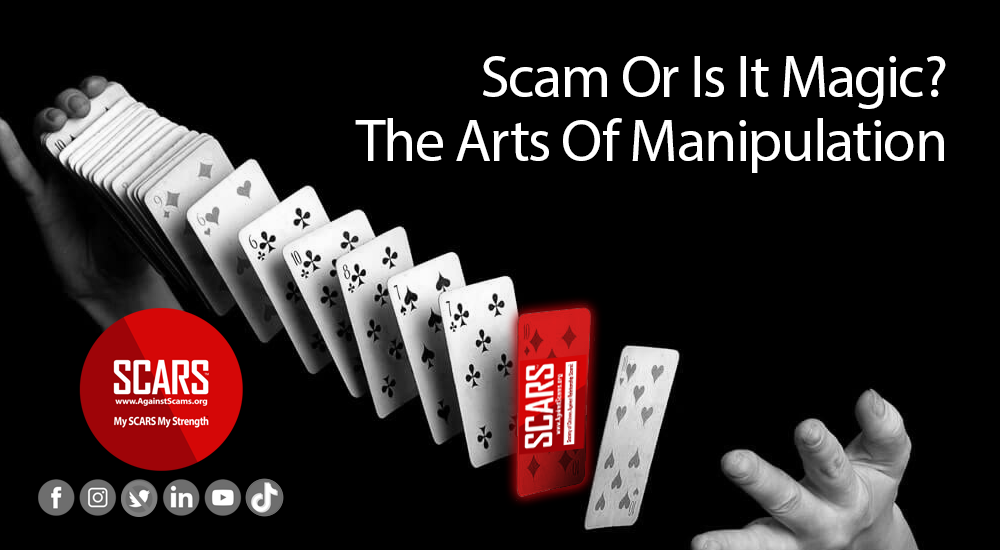Equivocation – The Magician’s Choice – The Arts Of Manipulation
Psychology Of Scams
A SCARS Insight
Many Victims Believed That They Made Their Own Choices During The Scam
They Frequently Cannot Forgive Themselves Because Of It – But In Reality, Most Of The Time The Scammer Made Or Led All The Major Decisions
Scams & Magic Have Much In Common
Scams & Magic Tricks are all about manipulation and control. The relationship is far closer than scam victims realize.
The levels of manipulation that a scammer puts their victims through can be as profound as that of an expert magician or mentalist.
YOU KNOW THERE IS NO SUCH THING AS REAL MAGIC, RIGHT?
IT IS ALL MANIPULATION AND ILLUSION!
Yet spectators to a magic show swear it was real – that it really was magic!
But it really is just skill! Skill at manipulation and illusion. Skill at forcing the spectator or audience member to do what the magician wants.
The same is true for scammers – either by training or intuitive skill, scammers have stumbled upon many of the same techniques that magicians use to control a victim in the same ways a magician controls a spectator or audience member!
Magician’s Choice is just one such technique. It is used extensively during fake videos to make the victim believe that they are making choices at specific times during the video, such as asking the person to perform some act as confirmation that they are really there, when in fact it was a prerecorded video. The scammer, like the magician, triggers a situation and forces the outcome or selection (Choice) when and where they want. However, not all scammers have the skill for this, which is why not all scammers can pull off a convincing video chat using what is really a recorded video!
This is also one of the reasons why so many victims believe the Urban Legend that they were controlled by Voodoo or JuJu magic!
Magician’s Choice
Equivocation (or “Magician’s choice” or “Equivoque”) is a verbal & visual manipulative technique by which a magician gives an audience member an apparently free choice, but frames the next stage of the trick in such a way that each choice has the same end result.
For example, the Magician may deal two cards to the table and ask a member of the audience to select one: if the audience member chooses the card on the left, the Magician will say something like “you keep this card, I’ll take the remaining card”. If the audience member chooses the card on the right, the Magician will take that card. Thus, the choice of which card to use is really made by the Magician.
These basic techniques can be expanded to include practically any number of items, such as an entire deck of cards. For larger sets, items may first be grouped, then split up. The magician must quickly and carefully craft chatter to convey the impression that the actions he or she takes with the items truly reflect the intent of the audience member.
Some Of The Techniques Used By Magicians Are
CARD FORCING: Equivocation can be used to force a card without the use of sleight of hand. The use of this kind of verbal force in close-up magic apparently offers a subject a free or random choice of card. It is not as common as sleight of hand or other methods because of its complexity and the skill required.
MENTALISM: In another use, a Mentalist may perform an apparent act of mind-reading by using the “magician’s choice” to force a particular envelope that relates to a needed outcome. A Mentalist may also force an effect from a certain outcome, as in taking something ordinary and using it to show their magical prowess.
EFFECTIVENESS: In each of these examples, the effectiveness of the equivocation (manipulation) involves the “information gap” between what the spectator knows and what the spectator thinks they know. In the Magician’s Choice (force,) the spectator does not know anything about what will happen to the two cards he initially selects. However, the spectator thinks that they are making a free choice in an otherwise scripted sequence of moves. In the effect of the prepared envelope, the spectator thinks they know that the envelope involves a prediction, but does not realize that the envelope, in fact, involves three predictions.
Equivocation tends to lose its effectiveness if repeated in the same context, since the spectator gains more information from one performance to the next, thereby shrinking the information gap. For example, a spectator may wonder why their choice was kept in some cases and discarded in others. Equivocation is a particular form of alternate ending that forces where double-entendre wording is used and a different pattern of results to questions can be noticed, but its real strength is best realized when augmented with artful psychological techniques.
The Scammer’s Use
Recognizing that scammers are far from stupid we see that the scammer uses artful manipulation to control the victim throughout the scam. From situational manipulation, such as during a prerecorded video chat and making the video believe it is real – to longer-term manipulation, making the victim believe that sending money is their own idea!
Scammers, in reality, are expert manipulators. The better a scammer is at this, the shorter the scam and the more the scammer makes!
Remember
There is only one defense against this kind of manipulation: DO NOT PLAY!
In other words, the only way to evade this level of manipulation is simply never to allow yourself to be in a situation where a scammer can take control.
It is not intelligence that avoids scams, in fact, your intelligence works against you. It is behavioral protections – stay away from the triggers and temptations that led you into the scam in the first place.




Please Leave A Comment - Tell Us What You Think About This!